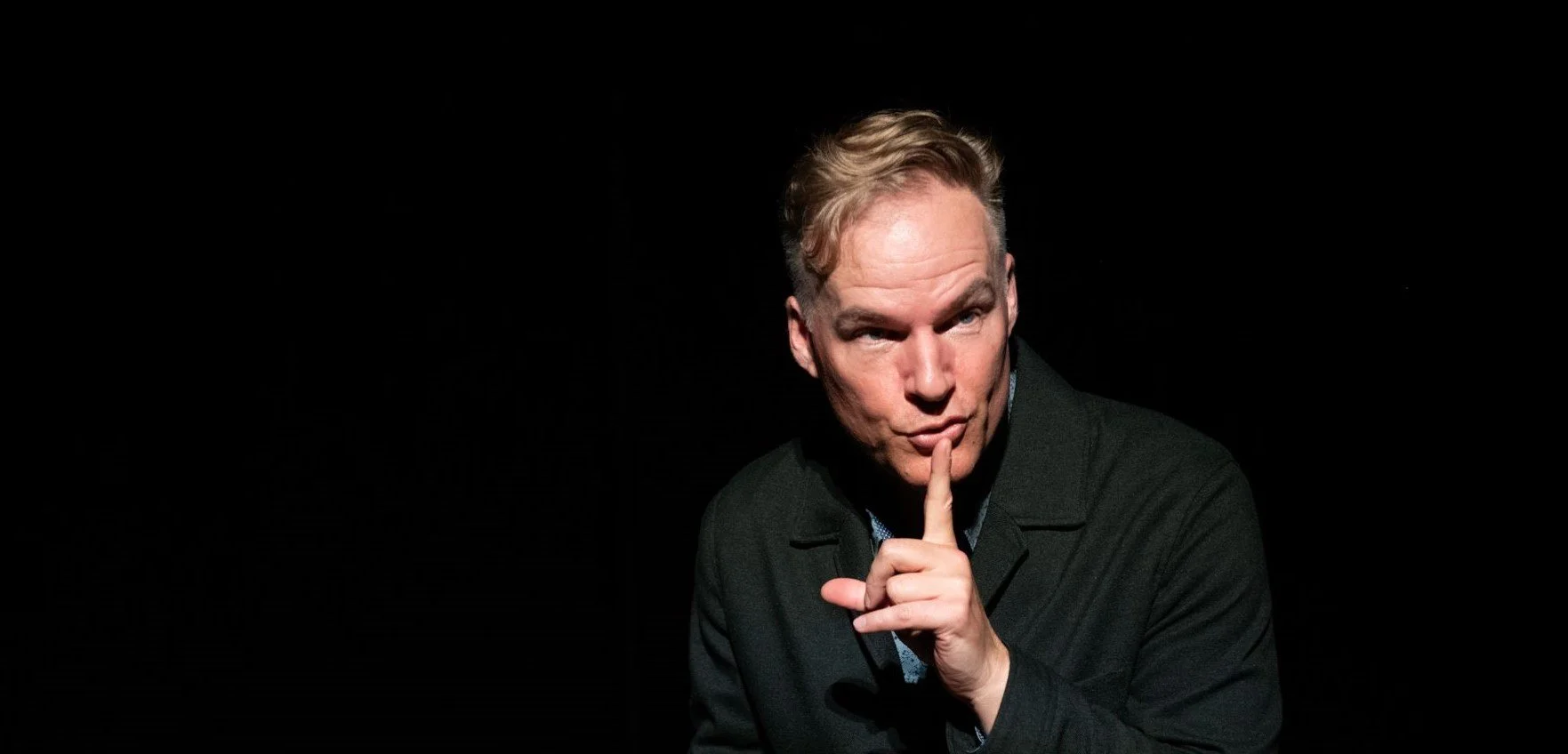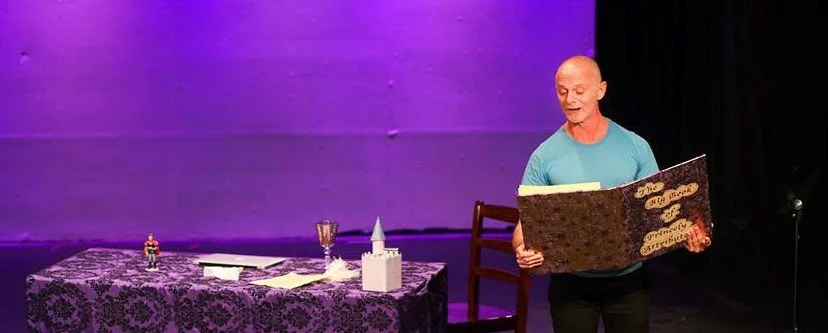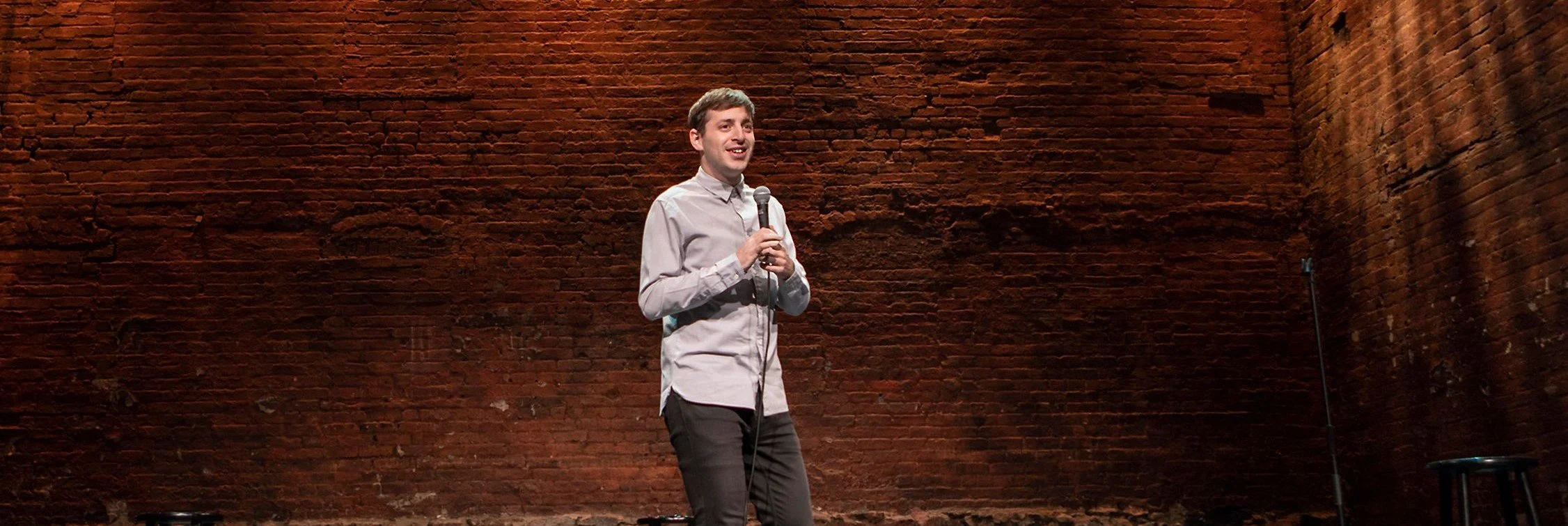Like René Magritte’s painting of a pipe with the sentence “Ceci n’est pas une pipe” (“This is not a pipe”) beneath it, Orietta Crispino writes “This is not about the past” on the wall behind her early in her solo show Let Me Cook for You. But over the next two-plus hours she talks a lot about her mother—deceased since 1994—as well as about the relatives she lived with growing up, her attempt at age 17 to meet the father she’d only recently learned was still alive, and the many times she has moved (at least 35 total in four different places in Italy and the U.S.). In other words: about the past.
Daughter of the Wicked
The impending 75th anniversary of the declaration of Israel as an independent state has prompted many controversial discussions. Among them are retrospective conversations about the country’s early days and questions as to whether those who struggled to create a cohesive post-Holocaust multicultural society also permitted systematic mistreatment of some citizens. How, for example, is it possible to justify the abduction of Yemenite children and the resultant grief and trauma for their families? Daughter of the Wicked, Shanit Keter Schwartz’s solo autobiographical play, deals in large part with her Yemenite identity, her immigrant parents, and her search for her missing sister.
Robin and Me: My Little Spark of Madness
Dave Droxler makes his living as an actor and voice-over artist, but he is also a gifted impressionist. His 2016 New York Fringe Festival show, Walken on Sunshine, was built around his masterly impersonation of Christopher Walken. Now Droxler has written a solo play, Robin and Me: My Little Spark of Madness, that showcases his equally spot-on impression of his idol Robin Williams.
Walking with Bubbles
Perhaps because one must dodge homeless people to get to the theater the time seems right for the new one-woman musical, Walking with Bubbles. Created, written and performed by Jessica Hendy, and based on her journey as a single mother rebuilding her life after her husband Adam’s mental illness and homelessness, this female-driven narrative is inspiring and may well impart hope to others in crisis.
The Smuggler
Ronán Noone’s The Smuggler heightens the inherent challenges of the one-person play with rhyming verse. The one-act “thriller in rhyme,” as it is subtitled, is a 9,000-word poem, but solo performer Michael Mellamphy, under the direction of Conor Bagley, clears the hurdles of the challenging form and effectively engages and entertains the audience—all while crafting cocktails and, of course, rhyming.
Sugar Daddy
Shortly after launching into his solo show Sugar Daddy, Sam Morrison talks about being mugged. The thief, armed with a gun, demanded his cell phone, and Morrison resisted because it had pictures of his late lover Jonathan on it. “I know we just met,” Morrison tells his audience, “but I think we can all agree that was off-brand.” (It’s clear from the audience’s ebullience that they know perfectly well what his brand is. The mostly young crowd in fleeces and pullovers and trainers have been boisterously waiting for him, even drowning out the pre-show music.) “I’m an anxious, asthmatic, gay, diabetic Jew,” explains the comedian. “We’re not known to excel in moments of crisis.”
Anthony Rapp’s Without You
Jonathan Larson, author and composer of Rent, died of an aortic aneurism on Jan.25, 1996, the night before his magnum opus, an innovative rock opera inspired by Puccini’s La Bohème, was to play its first public performance in New York. At 35, Larson had been writing Rent for seven years and would soon be honored posthumously with a Pulitzer Prize for Drama and Tony Awards for best musical, lyrics, and original score of the 1995–96 theater season.
Colin Quinn: Small Talk
Colin Quinn, the Brooklyn-born comedian and former anchor of “Weekend Update” on Saturday Night Live, recently explained in a radio interview that his stand-up routines are designed to satisfy his curiosity about “how people become the way they become.” In his new Off-Broadway show, Colin Quinn: Small Talk, the 63-year-old writer-performer focuses his comedic gaze on Americans bewitched by the Internet and ponders the extent to which their online activities affect society at large.
The Wildly Inappropriate Poetry of Arthur Greenleaf Holmes
Some people, as students or adults, hear the word “poetry” and run in the other direction. They’re that intimidated, bored, puzzled or whatever by it. Gordon Boudreau obviously understands this, as he has condensed the history of poetry to major highlights and demonstrates just how irreverent and free-spirited one can be with verse in his solo show The Wildly Inappropriate Poetry of Arthur Greenleaf Holmes.
Everything’s Fine
If big-city Easterners could imagine what life in Midland, Texas, is like, they might conjure up images of a remote, semirural, small city with mundane lifestyles, cowboy hats, and thick drawls. Well, most of the stereotypical descriptors don’t apply here. Other than for the Texas sand, wind, and heat that Douglas McGrath describes in his solo play Everything’s Fine, there is much in McGrath’s story about growing up there that is universal.
The Fall
Amsterdam’s red-light district, circa 1956. A man walks into a bar and chews on the question: What does it mean to fall from grace? And, as a man who is having a few drinks in a bar and talking to strangers, he will ask many more questions, sometimes personal and often philosophical. In The Fall, by Albert Camus, a French philosopher who won the Nobel Prize in Literature in 1957 and is considered the father of existentialism, the man in the bar is Jean-Baptiste Clamence, a former Parisian lawyer who has himself fallen from grace.
Remember This: The Lesson of Jan Karski
David Strathairn, whose stellar career as a character actor has spanned decades, gives a brilliant, riveting solo performance in Remember This: The Lesson of Jan Karski. Playing a Pole who experienced the Holocaust, he draws on historical evidence and the testimony that playwrights Clark Young and Derek Goldman employ in their portrait of a righteous and desperate man determined to prevent the annihilation of his country’s Jews. This is the real-life Karski, humble, modest, and painfully aware of what he could do, and more so of what he could not do, to save them.
The Near Disaster of Jasper & Casper
It can’t be easy to invent a brand-new fairy tale; even James Lapine and Stephen Sondheim had to rely on the old favorites. But here comes Jason Woods, not only cobbling together an entirely original fantasy with The Near Disaster of Jasper & Casper, but performing all the parts, with distinctive voices and personalities for all the characters. Woods may seize on some familiar plot points, and he’s not always tidy: “Jasper and Casper” don’t rhyme perfectly with “Disaster,” as he seems to have been aiming for. But he knocks himself out to engage the audience.
Katsura Sunshine’s Rakugo
Katsura Sunshine’s Rakugo is a fresh and funny solo show in which the director and star, Katsura Sunshine, spins yarns with entrancing charm in the ancient Japanese comic storytelling tradition known as rakugo. It is a pleasure to come across a piece that deals, wittily and delightfully, with a little-known dramatic art form.
Mister Miss America
Neil D’Astolfo’s Mister Miss America provides many pleasures beyond its nifty title, even though the material treads some pretty familiar ground. In the solo show, the beauty pageant obsessions of gay hero Derek Tyler Taylor (D’Astolfo) take center stage. DTT wants to share the story of his attempt to break the gender barrier at a beauty pageant in southwestern Virginia, where the contestants mostly hail from obscure burgs, such as Bristol, Galax, Martinsville and Radford, and the announcer uses descriptions like “She’s hotter than your pappy’s pistol!” as an introduction.
Prince Charming, You’re Late
The title of Billy Hipkins’s solo show promises lighthearted fun, and the actor often has a twinkle in his eye as he performs it. However, in spite of the elfin charm of Hipkins himself—a sixtysomething gay man who has worked in theater as a dresser and occasionally an actor—Prince Charming, You’re Late strikes many of the darker notes of a fairy tale by the Grimm brothers.
Yes! Reflections of Molly Bloom
James Joyce’s Ulysses is a brilliant but dense and sometimes inaccessible work. Aedin Moloney’s solo performance in Yes! Reflections of Molly Bloom is adapted from Molly's “Yes!” soliloquy at the end of Joyce’s novel. Co-created by Moloney and acclaimed Irish author Colum McCann, the show is a remarkably ambitious collaboration, a welcome contribution to understanding the complexities of Molly Bloom (wife of Ulysses’ protagonist Leopold “Poldy” Bloom), and a consummate one-woman show.
Jews, God, and History (Not Necessarily in That Order)
Can an atheist serve as a guide to the history, customs, and longevity of the Jewish religion and its adherents? Moreover, how can an atheist recognize that a man who has just died is with God? At first glance, this seems quite absurd. Yet neither for Michael Takiff nor for his audience does it appear to be a problem. Jews, God, and History (Not Necessarily in That Order), Takiff’s one-man show, is a roller-coaster ride through Jewish belief, identity, and practice.
How the Hell Did I Get Here?
For Downtown Abbey aficionados, it is an unlikely stretch to imagine Lesley Nicol as anyone other than the series’ jovial, wise cook, Mrs. Patmore. The leap of imagination that transforms Patmore into a painfully shy, insecure, aspiring and often overlooked actress is a dilemma with which the audience for How the Hell Did I Get Here? must grapple. Ironically, Mrs. Patmore and Ms. Nicol may share a Northern British accent, but that’s where any comparison ends. The former’s “extreme makeover” as fashionable Lesley Nicol is not a makeover at all, but an internal and external transformation from her early childhood. Isn’t that what good acting is all about?
Just for Us
Despite Alex Edelman’s opening caveat that “my comedy barely works if you’re not a Jew from the Upper East Side,” he is one of the rare, masterful stand-up comics who can “cast out” and then successfully “reel back in” a diverse audience. He can take his monologue way off-topic, on a tangent that itself could be a stand-alone show. Although the thrust of Just for Us is his attendance at a white-supremacist gathering, along the way he signs and mimics the distress of a gorilla at Robin Williams’s death (the gorilla really grieved), then quips that Brexit should be called “The Great British Break-Off,” and lovingly, yet mercilessly, spears his family, their Hebrew names, his brother’s Winter Olympics prowess as part of the Israeli skeleton team, and his Orthodox Jewish parents’ finessing of Christmas (including a decorated tree in the garage) to comfort a bereaved Christian friend.


























